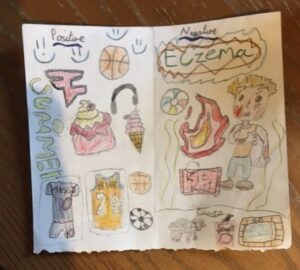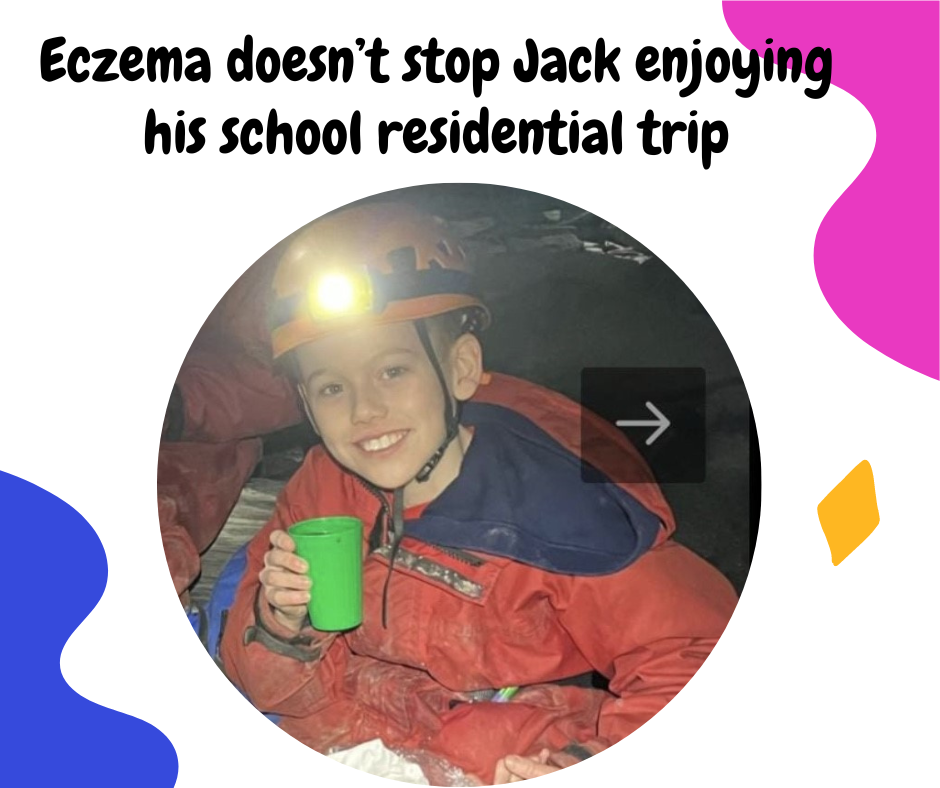Your child going on a school residential trip can be daunting for all parents.
You may be worried if they will eat well, will they be with friends and how will the sleeping situation pan out.
But if your child has eczema, the thought of several days away from home and parents or carers can be a huge concern and you may even consider not allowing them to go. They will be in new surroundings, in a different bed, doing new activities and may not apply their cream or prescriptions properly.
EOS member Leanne had these concerns before she sent her son Jack (11) on his first ever school residential last year but spoke to the school before the trip to explain about his skin and the care he would need.
Leanne said: “I had a meeting with the school before the trip and explained he would need to be creamed regularly and went over his allergies. The school said they would follow this and off he went. But that turned out to be a big mistake.”
Leanne was shocked when she picked Jack up from the trip. He was covered from head to toe in painful blistering eczema, so severe he developed cellulitis and it took weeks for his skin to get better.
“I couldn’t believe how bad his skin got over a few days. Looking back, it was partly my fault. I trusted Jack would be more proactive in his care and that the school would make him follow his routine. When I asked why his skin was so bad, Jack admitted he hadn’t been applying treatments and the school said Jack told them he didn’t need them so they didn’t force the issue.”
Understandably, Leanne was anxious about allowing Jack to go on his school trip this year after how sore he felt last year. However, prior to the trip, Leanne organised a meeting with the school headteacher.
“The headteacher was great and very understanding. I showed photos of Jack’s previous flares and she then created a care plan for me to fill in and we had a couple of meetings going over how best to care for Jack’s skin.
“Things like getting changed into fresh clothes after each activity and applying his creams regularly. He took his own bedding and pillows to the activity centre and lots and lots of clothes to change into so he would not be in damp clothes for any length of time. It meant I knew everything had been washed in detergent that agrees with his skin and all the fabrics were pure cotton.’

“They also appointed him a teacher to be his one to one to make sure he followed the care plan and gave him access to a private bathroom so he would have privacy to apply cream and change.”
When Leanne picked her son up after this year’s trip his skin was looking great, with no flare ups.
“I couldn’t believe the difference in him, his skin was great and he had a great time with his friends. He didn’t have to miss out on anything and took part in rock climbing and all the water activities.
“The school was great and had stuck to the plan. I think initially they didn’t realise the consequences of him not sticking to it, thought eczema was just a bit of itchy skin and that was partly my fault. I should’ve been more clear and put a plan in place.
“I’m so glad we tried again with a care plan, kids with eczema miss out on a lot and I really wanted him to go and have fun with his friends. By planning and working with the school, Jack got to go on the trip and had a great time and his skin didn’t suffer.”
You can get additional advice on coping with eczema at school here. This resource can help share your child’s condition and needs with their school and gives information on our school workshops. These interactive sessions helps school staff and pupils to understand the condition better and be able to support a child with eczema. You can request a school workshop by filling in this form.





